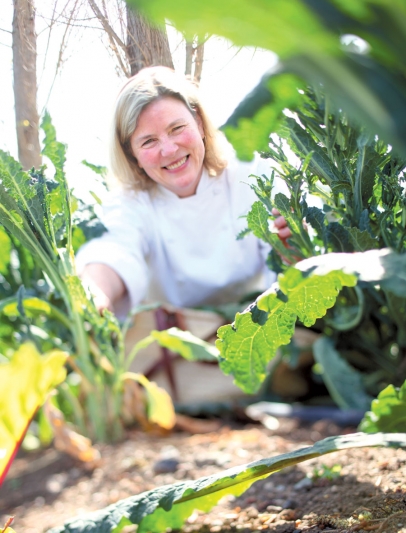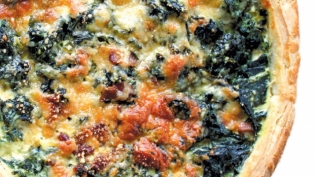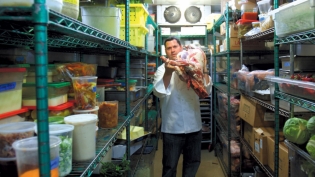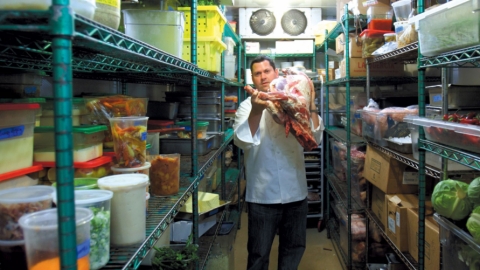Sarah Scott, Private Chef, Culinary Consultant and Cookbook Author, Napa
A simple act is all it takes to change your life. For Sarah Scott, a serendipitous walk into Napa’s Cuisine Renaissance was “all” it took to switch from a career in journalism to one in cooking. Part wine bar, part cooking school and restaurant, Cuisine Renaissance was a culinary destination ahead of America’s food revolution. Sadly, it closed in the 1980s, long before the rest of our area caught on.
“There was something about it,” says Scott. “I realized I had found my niche.”
Shortly thereafter, Scott took a job at the site of her epiphany, and began building a culinary career, one small step at a time. Scott’s path took her through the Napa Valley Cooking Class at Trefethen Family Vineyards, where everyone from Jeremiah Tower and Cindy Pawlcyn to Michel Richard and Charlie Trotter came through as guest teachers.
“I learned 10 ways to filet a salmon and grill a beef heart,” says Scott.
Scott went on to start her own catering company in 1984, and it was during this time that she began to cook for the Mondavi family and their winery properties in the Napa Valley. She joined the Robert Mondavi Winery as executive chef in 1993. During her tenure there, Scott was very involved with the Great Chefs Cooking School at the Winery and cooked alongside many of the 3-star Michelin chefs of France and Italy, as well as American superstars including Thomas Keller, Daniel Boulud, Julia Child and Alice Waters.
As a private chef and consultant, Scott remains closely involved with the storied Mondavi family today—including cooking for many of their events, and privately.
During her many years at the heart of Napa’s wine scene, Scott learned to create dishes that cast a spotlight on wine, tweaking the acidity and salt in a dish to let the wine taste its best. A Francophile in Napa, Scott recalls visiting France and thinking that the French approach to food was similar to that of Southerners.
“The cooking was similar enough at a basic level,” she says: “Don’t mess with things that are really good.”
But mess she does. Scott, who grew up on fried chicken “double-dipped in flour, no egg, cooked with bacon fat and Crisco in a cast-iron pan,” experiments with different preparations of the dish. Brining, buttermilk soaking, swapping out a portion of the flour for cornstarch and cooking the bird in duck fat have all had their moment.
“I love the challenge of a new dish,” she explains.
As a child, Scott experienced the competitive side to cooking. Doing things right was a “source of feminine pride” and “you knew whose biscuits were the flakiest or whose recipe got included in the church cookbook.” In California, that competitiveness has been replaced by something more Californian: camaraderie. “There is no one-upmanship here,” Scott says.
She considers herself lucky to have grown up in the South, where the culture of food is central to everyday life.
“I was given this wonderful palate,” she says. “I learned what good food tasted like.” And good food, like good wine, knows no boundary.
Where are you from?
I was born in Montgomery, Alabama, and grew up in Atlanta, Georgia.
At what age did you begin cooking?
I can remember starting to bake at around 7 years old. Cakes. Biscuits. Cookies. Banana pudding.
From whom did you learn to cook?
I learned to cook from Bobbie Lee Jackson. She was the cook at the Druid Hills Presbyterian Church, where my father was the minister. She came to our house during the week to cook and clean, and I was always in the kitchen with her. I also went down to the kitchen at the church when she was cooking and she let me “help.”
Is there one dish (or ingredient) that defines the place you grew up?
Fried chicken. Followed right away by turnip greens, baked ham and biscuits.
What is your first/favorite food memory?
Fig preserves. My Grandmother Ector was considered the best cook in Florence, South Carolina, and she made these every year. They were golden brown and sweet, with a pleasing crunch from the seeds. She also made her own bread and I remember eating warm toast, spread with melting sweet butter and those fig preserves.
What is the first dish that you remember cooking by yourself, or mostly by yourself ?
Bobbie Lee taught me how to make Johnny Mazetti, a casserole made with spaghetti noodles, a meaty tomato sauce, green olives and cheddar cheese. I LOVED this dish and watched her make it over and over again until one day she told me it was time for me to make it. I still remember the thrill of putting it together, seeing it come out of the oven and having my family say, “It tastes just like Bobbie Lee’s!” That was the highest compliment. [See Scott’s recipe for Johnny Mazetti on our website.]
When did you first leave the South, and what/who was it that brought you out?
I left a couple of times to go to college in Washington State and in Green Bay, Wisconsin, but always came back to Atlanta, where I graduated from Georgia State University. I didn’t come to California until after I graduated and it was on a road trip with my boyfriend, now ex-husband.
Southern ingredient you can’t live without?
Mayonnaise
Southern food you miss the most?
I miss a good pot of greens, cooked until really tender with a salty, meaty ham hock or piece of fatback and the cornbread to sop up the pot likker.
I always ordered these greens—whether turnip greens or collards—at a place called Mary Mac’s Tea Room in Atlanta. Also, the Colonnade. These restaurants are “meat and threes,” where you order a protein and three vegetable sides. You can also just order vegetables, which I loved to do in the summer when corn and okra are always offered along with the greens and maybe fried green tomatoes.
Favorite Southern dish?
Fried chicken
How often do you have that food now? Do you cook it for yourself, or just have it when you dine out?
I have fried chicken fairly often. I make it myself the way I learned from Bobbie Lee, but I also experiment. Brining. Buttermilk soaking. Mixing flour with cornstarch or potato starch. Lard, bacon fat, duck fat.
Southern food you wish would never be served again?
Chitterlings [also known as chitlins]
How do you incorporate Northern California and/or international ingredients into Southern dishes?
I don’t like to mess with Southern food too much. I’m a traditionalist. What I love about the ingredients in Northern California is their freshness and flavor. Using an organic, air-chilled chicken for my fried chicken tastes so much better than a soggy, bagged commodity chicken. Fresh greens from the farmers’ market or friends’ gardens are delicious and hold their flavor when slow-simmered with a hormone-free ham hock. Artisanal bacon makes a killer BLT and dreamy creamed corn.
Do you think your Southern heritage influenced your love and appreciation of food?
Definitely. Food is central to the Southern way of life and I was aware of this early on. We sat down to a home-cooked meal every night for dinner. If my mother didn’t make it, she made sure to have one of Bobbie Lee’s hams or a batch of fried chicken or Chicken Divan casserole on hand.
Food was a big part of the social life of the church I grew up in. Family Night Suppers at the church every Wednesday night. The whole congregation gathered at long tables to eat, tell stories and sing.
Summer Vacation Bible School meant deviled eggs, potato salad, fried chicken and sliced tomatoes with red onions and cider vinegar, followed by peach pies and fresh-churned ice cream. Holidays at our house were big spreads of food and extra tables set up for the folks at the church who didn’t have families.
It was just plain rude to not offer a visitor something to eat when they came to the house, and you could judge accordingly if you weren’t offered something at someone else’s house: Sweet Tea. Hot tea. Pecan shortbread. Cheese straws. Beaten biscuits. Something, for God’s sake.
I feel like I was born into this culture of hospitality and feeding people—the joy of it and the compulsion of it—and it marked me for life. I didn’t know I would grow up and become a chef, but realized it was my calling and my entire career has been informed by the tastes, smells and traditions of the South. I am so grateful to have been raised and surrounded by good cooks, loving cooks, cooks whose piecrusts could make you cry, they were so tender.
Favorite libation?
While I do love a good shot of bourbon, I tend to drink wine with my meals. Everything from Chardonnay to Gruner Veltliner. The dryer and more balanced, the better.
Favorite Southern-based band and/or song?
Arrested Development
Pie or cake?
I have to go with cake. Even though I love a good pie, it has always been an excellent pound cake that has been my downfall. Or a tender coconut cake or spice cake with caramel frosting. I still am on the lookout for the ultimate recipe in these categories, but I have amassed a great collection along the way.









